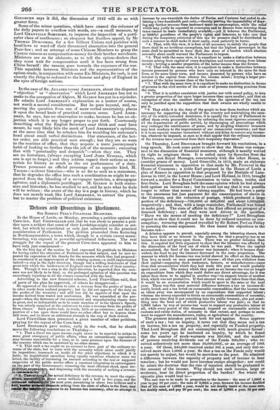NEWS OF THE WEEK.
Sta, Bone= PEEL'S bold scheme of Finance, of which we gave an outline in our last Postscript, is now before the country ; and our
readers are presented in a Supplement with a full report of his
speech on the 11th, carefully collated from several versions, with a copy of the new Tariff. When Sir ROBERT rose to make his finan-
cial statement, he was watched with a silent expectation: it was understood that now was to be brought forth the measure for which he had asked time. As a financial statement, his speech is a model of clearness: his perfect preparation, the businesslike mode of his exposition, and skilful elocution, commanded the envy of anta- gonists. In regard to importance, his measure did not disappoint expectation : he avoids no difficulties—conceals them not, nor exaggerates them ; but meets them as they are. He treats the perennial deficiency as such : he does not make the nation con- tinue to live beyond its means by concealing the want under a pettifogging system of national bill-discounting; but vigorously calls upon the strength of the country to make good the demands
up;_,s. it, ftSIi to take measures for supplying the future demand from an iniproved finance. Throughout the speech there is a sweeping admission of Free-trade principles; and it is a fact of some moment, that the chief of the Tory party, its ornament and stay, adopts these principles as a rule of action. Broadly con- sidered, his scheme of additional taxation is meant to fall upon the
richer portion of the community, the poor being exempt from the
chief tax, on income. Of course that proposition has called forth a ready and vehement hostility from various quarters—from the partisan, the prospective tax-payer, and the dissentient economist. Within his own House of Parliament he has been made to run the gauntlet from night to night amid repeated questionings; but he has stood firm, and, whatever his disposition to yield, none has yet been evinced.
Lord BROUGHAM asked the Lords, on Thursday, to adopt a ma- nifesto which he had indited against the Income-tax in the shape proposed by Sir ROBERT PEEL; but the Lords would not be
moved, even to speak. Only Lord Biros consented to say a few words against the inconvenience of pronouncing a judgment which
might have to be retracted in a few days, unless the House were prepared to reject Sir ROBERT PEEL'S bill. Now Lord Bnotionitai's speech reads as if he expected it to come to nothing : it lacks his
clear and abundant argument, his active illustration, brilliant lan- guage, and playful satire. Nevertheless, passages in it—such as his explanation of the way in which the proposed tax on profits
will really in some cases fall on capital, and his appeal for the rights of trades and professions—though the matter is not new, have something of his happy manner, and will find a response in many a bosom oppressed with the weight of anticipated taxation.
The Corn-importation Bill proceeds in the Commons as fast as the talkers will allow. To the motion to go into Committee, on
Monday, Mr. WARD interposed another motion, for a preliminary
inquiry into the special burdens on land. The debate was tame and dull. In fact, after the general proposition is set forth, there is not much more to be said about it. The advocates of a law to
restrict the importation of corn allege, as one justification, certain special burdens : but they do not define them—Sir ROBERT PEEL
says that they cannot be meted • and therefore, like any other bare assertion, the allegation, in sound reasoning, goes for nothing. The debate, then, was about something which has no tangible existence. Say that the Legislature is composed almost exclusively of land- owners or their retainers ; that, with the natural predilections of all classes, they have been unable to see the justice of assuming a share of the national Burdens proportionate to their means ; and that they, the richer classes, so order it that they give less to the public treasury than the poorer classes ; and there you have a plain and 'palpable fact rather more self-evident than the peculiar bur- dens on land. No one of their advocates adduced the slightest proof that they pay any considerable proportion of the fifty millions
of revenue; while the great fruitless tax, the Corn-tax, is main- tained for their special benefit. The debate on that point disposed of, nine clauses of the bill were dragged through the Committee, and a few amendments were brushed away ; and then Mr. Bao- 'MERTON pointed to the clock.
The episode of Mr. FERRAND and his rhodomontades against the manufacturers continues. He has called forth from Mr.
COBDEN rather an indignant denial that he sells milk, accom- panied by the hint that he is willing to meet Mr. FERRAND hi the encounter of personalities, if' he will persist : whether in a compa-
rison of private character, or in the vulgarer method of the duello, appeareth not. As challenger, however, Mr. CORDER has no right to the choice of weapons ; he cannot claim, therefore, to
fight each with his own character for an arm, advantageously as he might feel himself able to use such an instrument. It is retorted upon Mr. Connim and his friends, that if they complain of these personal attacks, they set the example, in denunciations of " rob- bery " by the landlords and so forth. Yes ; but usage accounts that kind of generalizing hyperbole, objectionable and self-recoiling as it is, a very different thing from imputing to individuals the commission of odious and sordid offences. Mr. FERRAND has un- dertaken to prove the Anti-Corn-law League, seriatim, according to any list with which he may be furnished, guilty of practising the truck-system: Why, the man who can talk in that random way, undertaking to substantiate charges against every individual in a class while positively ignorant of their names, must be destitute of a sense of moral responsibility in assertion. At first he was cheered as a fox with a firebrand at his tail; but the fire has gone out in smoke, and the cheers grow faint. The Scottish Church question was brought up on Wednesday, by two successive motions ; Sir ANDREW LEITH HAT moving for correspondence about the Elgin presentation, in order to plead generally the cause of the Nonintrusionists and their claims to a bill : and Mr. CAMPBELL moving for a Committee of inquiry to enlighten the English Members. The Church have been in nego- tiation with Governmeet for a measure of settlement ; neither party can agree to terms, tlin.aliurch violently withdrawing from the ne- gotiation ; anti now there is something exquisitely ludicrous in Sir ANDREW'S advance, on behalf of the Church, in forma pauperis, to beg for a satisfactory measure after his client has declared that she will not be satisfied. All that he took by his motion was to elicit the emphatic declaration by Sir JAMES GRAHAM, that Government will no longer court the impracticable Church, but that they have retreated upon the law, determined there to take their stand. After what Sir JAMES said on Wednesday night, it will be impos- sible for Government to move again in the matter until the majo- rity in the Assembly have cried " Peccavimus." One other door, then, is shut against the zealots. Mr. Camenzies proposal to en- lighten the English Members is equally amusing : let him console himself for the loss of his motion by knowing that the more clearly the English Members understand the pretensions of the Scottish State Church in regard to independence of the civil power, the more they won't legislate for it. Lord Elusion Eoza•rox's endeavour to introduce a bill for re- moving prohibition from marriages of affinity has failed. The closing debate on Wednesday was fiat : the opponents of the bill contented themselves with repeating their appeals to prejudice or to dogma. Mr. VERNON SMITH thought that he had made a smart blow when he said that there appeared to be no strong feeling in- favour of the measure. But that scarcely suffices as a reason. The bill seeks to remove a penalty which injures individuals—a confes- sedly small class in comparison to the vast amount of the population: but it would be no argument against a strictly private bill—a divorce- bill or a naturalization-bill--a bill to remove personal disabilities— that there was no popular feeling in its favour. The measure before us was half-way between a public and a private measure; it sought to remove disabilities from a great number of individuals: . the grievance, which presses heavily on them, was proved : it should have been proved in bar that its enactment would have been prac- tically injurious to the people at large : not a shadow of such proof
was adduced. The issue of the application to Parliament leaves the question in this state : a custom exists which is stronger than the law, for the penal disabilities directed against it are inoperative to deter ; while a little more than one half of the House refuse to alter the condition of that ineffectual but vexatious law, the other half pronounce the marriages which it prohibits to be harm- less, proper, "sanctioned by custom," fit to be sanctioned by legis- lation, and, as it is, mere technical breaches of the law, involving no moral degradation. Mere technical censure will not prevent what is endeared by affection, sanctioned by custom, and approved by a large minority in the Council of the Nation. Such marriages, then, will multiply ; and large will be the harvest reaped by the
lawyers, in suits arising out of the technical illegitimacy of future generations who have property to be scrambled for.. If the dis- cussion on the bill of 1835 stimulated to such marriages, as Mr. Gouramarr says it did, the discussion of 1842 will do so with greater force. Some of the minor questions, which have caused the columns of the daily papers to overflow with words, are—a small measure, by Lord GRANVILLE SOMERSET, to improve the inspection of a parti- cular class of madhouses ; an eloquent but fruitless appeal, by Mr Thomas DUNCOMBE, for a few Gilbert Unions and parishes with local laws to ward off their threatened absorption into the general Poor-law ; and an attempt of some Chinese Members to grasp the Canton ransom as compensation-money for their brother merchants. Ministers are so far obdurate, as to tell the opium-dealers that they must wait for compensation until it has been wrung from China herself: the ransom goes towards the expenses of the war. This squabble between Ministers and the representatives of the opium-trade, in conjunction with some Ex-Ministers, for cash, is not exactly the thing to redound to the honour and glory of England in the eyes of foreign nations.



















































